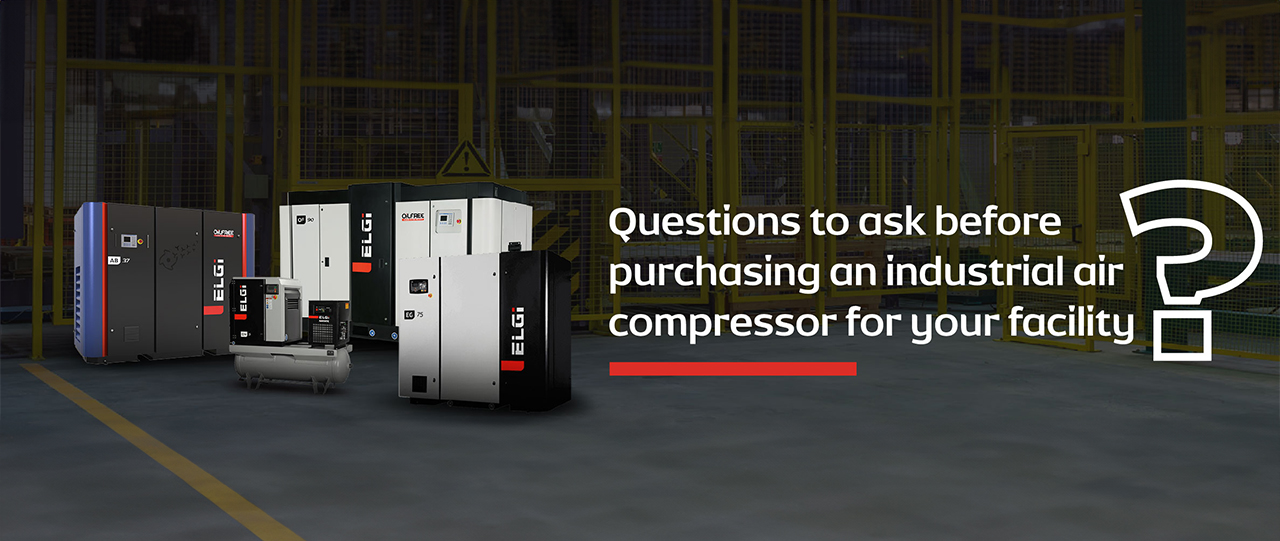What questions should you ask before purchasing an industrial air compressor for your facility

Questions to ask before purchasing an industrial air compressor for your facility.
Purchasing an industrial air compressor is a significant decision for any business. The purchase of an air compressor is a large capital investment. You would want to make sure to ask all the right questions to make sure you have an air compressor that will meet your compressed air needs in the long run.
ELGi has put together a list of questions you should ask as you are doing research on the air compressor you plan on purchasing.
What are the specific air requirements?
Determine the required air pressure (PSI) and flow rate (CFM) for all the tools and equipment that will be powered by the compressor. This information will help you select the appropriate compressor size and capacity. If you are unsure of how to determine your air requirements, our trained compressed air system specialists are able to visit your facility to help you asses your needs.
What type of industrial air compressor is needed?
There are different types of air compressors, such as reciprocating, rotary screw, and centrifugal. Each type has its own advantages and disadvantages, so consider the application and usage to select the most suitable type. There are also oil lubricated air compressors and oil-free air compressors to consider. This will depend on how you plan to use the compressed air. Reach out to the ELGi team to have a compressed air expert help you determine the air quality needed for your specific application.
How will the compressor be powered?
Determine if the compressor will be electrical or diesel-powered. Electric compressors are more common for indoor use, while diesel portable air compressors are suitable for outdoor or remote locations.
What is the available space and installation requirements?
Measure the available space in your facility to ensure the compressor can be accommodated. Also, consider any specific installation requirements, such as ventilation, cooling, and noise considerations.
What are the noise levels?
Compressors can be noisy, and this can affect the work environment and safety of your employees. Check the noise levels of the compressor and ensure they comply with any local regulations or workplace safety standards. This is especially important if your air compressor will be located near a working area as you would want to make sure the air compressor selected has a lower decibel rating to ensure the safety of your employees.
Is the compressor energy-efficient?
Energy efficiency is essential for reducing operational costs. Power consumption is the most significant component of an air compressors total life cycle cost. Ask about the compressor's energy consumption and look for features like variable speed drives or energy-saving modes. Verify the energy consumption reported by the manufacturer by checking technical data sheets. The Compressed Air & Gas Institute (CAGI) has a third-party testing program known as the “Performance Verification” that validates manufacturers' claims of rotary screw air compressor performance. Not all manufacturers have their performance verified, so be sure to visit cagi.org to learn more about validated technical data.
What are the air compressor maintenance requirements?
It’s important to understand the total cost of ownership. This includes initial cost, power cost, and cost to service and maintain. Ask about the maintenance needs of the air compressor, including scheduled servicing, spare parts availability, and expected lifespan. Proper maintenance is crucial for the efficient and reliable operation of the compressor.
Does the manufacturer offer a warranty and after-sales support?
Ensure the manufacturer provides a comprehensive warranty and after-sales support for the compressor. This will help in case of any issues or breakdowns during the operational life of the compressor.
Can the compressor be easily serviced and repaired?
Assess the ease of servicing and repairing the compressor. Easy access to components and availability of spare parts can reduce downtime during maintenance or repairs.
By asking these questions and thoroughly researching your options, you can make a well-informed decision when purchasing an industrial air compressor for your facility. Don’t hesitate to reach out to ELGi or your local distributor to help you with the decision process.
To find your nearest compressed air distributor, visit: https://www.elgi.com/us/distributors/

